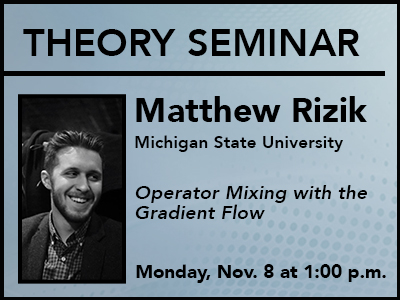Theory Seminar - Matthew Rizik
- Theory Seminar - Matthew Rizikhttps://jlab.bluejeans.com/319089525/6769Remote2021-11-08EST13:00:00 ~ 2021-11-08EST14:00:0016120
We kindly ask all attendees to provide their full names on BlueJeans when entering the event.
Speaker: Matthew Rizik (Michigan State University)
Title: Operator Mixing with the Gradient Flow
Abstract: The hypothetical presence of a nonzero electric dipole moment of the neutron would imply a violation of charge-parity symmetry (CP) which is absent from the Standard Model. Toward the characterization of potential BSM sources of CP violation, we study effective interactions in which the high-energy BSM fields are integrated out, leaving a basis of higher-dimensional, local QCD operators. Since these are composite operators, any attempt at renormalization involves some sort of operator mixing, which, at hadronic scales, must be studied nonperturbatively on a lattice. Naturally, the operator mixing is parametrized solely by the lattice spacing, producing power and logarithmic divergences as the regulator is removed. We use the gradient flow to reparametrize the operator mixing in terms of the flow time, so that at fixed flow times, each continuum limit may be taken independently, taking the physical $t\rightarrow0^+$ limit only at the end. Additionally, since operators are multiplicatively renormalized at positive flow time, the identification of the physical renormalized operators becomes a simple matrix inversion, in which the divergent operator mixing may be calculated in perturbation theory and subtracted off to arbitrary order. We study the leading-order renormalization of the quark chromoelectric dipole moment (qCEDM), presenting both nonperturbative and next-to-leading-order perturbative results on the power-divergent mixing with the pseudoscalar density with some perturbative results on the leading logarithms.

